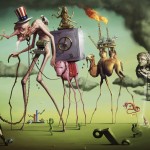
New Technology (IoT) Is About To Change The World As We Know It – Should We Be Worried?
By Nataša
The Internet of Things (IoT) – what is it?
A couple of days ago I run into an internet add about some new digital technology that could bring fortune to early investors. More research led me to videos and articles about this developing technology called The Internet of Things, which is supposed to overturn the internet as we know it today. Never heard of it before, so that puzzled me even more.
In a TED talk from 2012 Dr. John Barrett is talking about The Internet of Things (IoT) with amazement and wonder and he seems quite certain that this technology is about to become reality. He says, that we may as well get used to the idea because it’s already happening. Every major global government and every major economic block is investing heavily in the Internet of Things (IoT). There are already hundreds of millions of things connected to Internet. We are heading to hundreds of billions and trillions things… so just get used to it. It will change our lives. That is certainty, says John Barrett in the video below.
European Commission is also preparing ground for implementing this mysterious new technology into our societies.
“The European Commission today announced actions to make sure that Europe can play a leading role in shaping these new networks of interconnected objects from books to cars, from electrical appliances to food – in short the emerging ‘internet of things’. The EU’s Action Plan presented today will help Europeans benefit from this evolution and at the same time address the challenges it raises such as privacy, security and the protection of personal data.” (Brussels 2009) Read more here.
What do I think right now? I think that this technology will complete what the Internet has begun, the road towards AI (artificial intelligence). Barrett says that by 2020 half of the world population will be connected to the web, and with IoT all the physical things around us will also be connected to the Web by means of RFID, sensors, and all kinds of technology developed as we speak.
I wonder if IoT will eventually make us totally addicted to the Internet and Smartphones. IoT sounds more like the movie The Matrix to me or Skynet from the movie The Terminator? Time will show.
Let us see what IOT is?
In his TED presentation dr. John Barrett talks about individual targeted marketing, health scans, choice of music, smart cars, smart furniture and much more, all things connected to IoT and your Smartphone. You would not have to think much for yourself, but just know how to use your Smartphone and to have some basic language skills would be fine too. Your Smartphone will be connected to sensors built into things all around you and by processing all that information your Smartphone will suggest what kind of music you should listen, which videos you should see, what books to read, what food to eat, which people to connect with and communicate to, what to wear, it will correct your driving route as you will be driving a smart car too, what game to play, what pet to own, in other words, your Smartphone will be your external mind helping you out in your daily life.
You can find more videos on YouTube, that explain The Internet of Things and what it will mean to us. Here is one:
Amazing, isn’t it? Everything is about to get scanned and chipped. Sensors and cameras are to be installed all over the place to enable the flow of information and make us more comfortable and more secure. Everything will be controlled by a touch of a screen and simply, our Smartphone will decide what is best for us by processing all the incoming information from sensors in our body and in our surroundings. You will not be bothered with annoying dilemmas like what to do or what to think, because your Smartphone will be doing the thinking.
It is not my intention to be a partybreaker, nor to scare you. There are probably some useful aspects of this technology, as we have seen with Internet, which has brought the possibility of sharing information that was inaccessible before. I just want to inspire your to wonder and think about the world we all live in. What is the purpose of this system and who will be collecting the profits? What are the consequences and are we being asked if we want to live in a virtual-reality-like-world with smart machines and computers running our lives?
Whatever happens this stuff is coming our way.
Next video shows how these people visualize our future. This is a presentation of a normal, but “smart” family in the near future. Sad thing is that the family depicted in this video is such a cliché perfect family making it hard to believe the story. It actually sounds like the same old song: get up, do not think, go to job, do not question, work, spoil yourself by buying stuff, that will make you happy and then buy some more stuff, go home to your more than perfectly happy smart family.
All that technology and still the same routine, what a glorious future.
Watch the video yourself and see the smart game you may come to play soon:
What can you conclude from the video?
In the future getting up for work will be easier, driving to work will be easier, shopping will be easier. Everything will be the same, but with a touch of smart.
Is this technology already in use?
IoT is literally on our doorsteps. It is slowly being implemented in our daily lives without us even noticing it. Gartner, Inc. forecasts that 4.9 billion connected things will be in use in 2015, up 30 percent from 2014, and will reach 25 billion by 2020. The Internet of Things (IoT) has become a powerful force for business transformation, and its disruptive impact will be felt across all industries and all areas of society. All the things in our environment can be connected to each other and to the Internet. Maybe you have already heard about smart meters, smart thermostats, smart locks or smart cars. Many companies offer various sensors and smart-home kits that can monitor things like who is coming in and out of your house and can alert you to potential water leaks, to give homeowners peace of mind. link
Should we be worried about IoT?
Are we vise enough to embrace such technology? I really do not know, but it somehow scares me and makes me think of all those old Sci-fi movies I saw over the years about the man and the man made technology. The fact is that we live in a world led by profit. Everything is about business, competition and how to make money. IoT is just a new product for insanely rich investors, but the thing is that they need a market for it. They need us to buy the picture of the world, where they can sell us whatever they want and the fact is that Smartphones are spreading like bushfire, so when everybody is connected to the Web, all they will have to do is to connect all the things around us to the Web (our bodies too) to gain complete control. Will we happily continue working and consuming whatever our Smartphone tells us to? I know people that would do just that and would be happy to be told what to do, what to wear, what to eat, what to watch and listen to, if it is sold as a smart trend or as a medical or scientific advice. It seems that Descartes “Cogito ergo sum” will turn into “I use Smartphone therefore I am”.
Investors have already started selling their expensive product to governments, and are marketing it as a means of improving infrastructure, healthcare and social services. They promise reduction of costs as society would be run more effectively and justly by these smart systems and the life of the worker would be much easier, healthier and happier.
What a story!
…
From a business perspective, there are two major benefits of the Internet of Things(Iot): cost savings and income (sale of products). As it stands, the majority of IoT innovations are designed for cost-cutting purposes and far less for actual gains. While the potential is seemingly limitless, businesses are struggling to find truly effective ways to market and create revenue from IoT.
IoT product platform EVRYTHNG wants to make all home appliances, electronics and CPGs part of the Internet of Things eco-system. By tagging each appliance, the product could have its own information portal online and be able to help the consumer use the product to its utmost; for example a camera that can message you when the time and location is perfect for taking photos. By bringing this intelligence to bear, not only does the consumer learn everything about the sourcing, production and use of these products but the business can start to view each item as a freestanding piece of media that can further extend the consumers interaction with the brand story by way of it’s connectivity.
To me, all of this is about the perpetuation of consumer ideology. No wander, no magic, no questions asked. Everything will be decided for you and for your best, so they say.
The future will be smart. We will have Smartphones, Smart cities, smart cars, smart house appliances, smart clothes, smart furniture but what with us – will we be smart?
What do you think?
Another clues – Neuromarketing
IOT made me look into Neuromarketing, which is a new way of researching consumer behavior and marketing tactics.
More about it coming soon …
Cheers and try not to keep your eyes wide shut.
Natasa
More info:
When your yogurt pots start talking to you: Europe prepares for the internet revolution
RFID Technology: Lisbon Conference has set a milestone in forging the ‘Internet of Things’ (2007)
e.Digital Granted New Patent for Interpersonal Awareness and the Internet of Things Technologies (2015)
A Beginner’s Guide to Understanding the Internet of Things
Forbes – Don’t Underestimate The Impact Of The Internet Of Things







Leave a reply